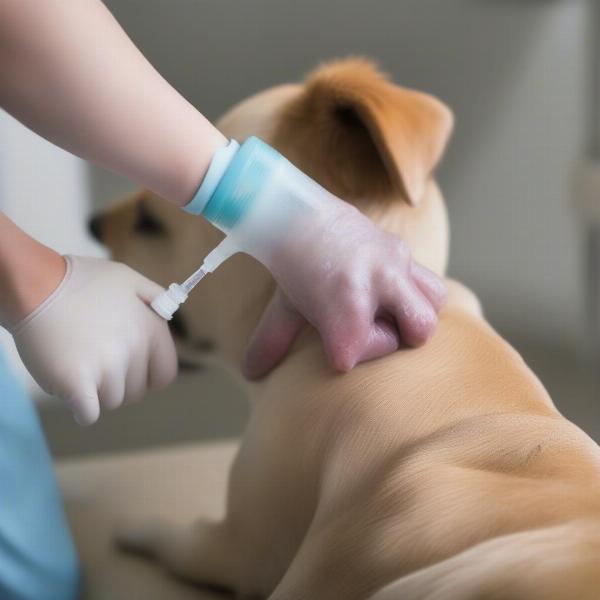Hypochlorous acid (HOCl) has gained popularity as a cleaning and disinfectant solution for various purposes, including use on pets. But is hypochlorous acid for dogs safe and effective? This article dives deep into the science behind HOCl, its potential benefits and risks for dogs, and how to use it correctly.
Understanding Hypochlorous Acid
Hypochlorous acid is a naturally occurring weak acid produced by the body’s white blood cells. It plays a crucial role in the immune system’s fight against infection. Synthetically produced HOCl has similar properties and is used in various applications, from wound care to sanitizing surfaces. Its effectiveness lies in its ability to disrupt the cell walls of bacteria and viruses, effectively neutralizing them.
Benefits of Hypochlorous Acid for Dogs
When used correctly, hypochlorous acid can offer several benefits for your canine companion:
- Wound Cleaning: HOCl can be used to clean minor wounds, cuts, and abrasions on dogs. Its antimicrobial properties help prevent infection and promote healing.
- Skin Irritations: For dogs with itchy skin or hot spots, HOCl can provide soothing relief and help manage bacterial or fungal infections contributing to the irritation.
- Ear Infections: Veterinarian-approved HOCl solutions can help clean and manage certain ear infections in dogs. Always consult your vet before using any product in your dog’s ears.
- Odor Control: HOCl can neutralize odors caused by bacteria, making it a helpful solution for cleaning pet bedding, toys, and other surfaces.
 Cleaning a dog's wound with hypochlorous acid
Cleaning a dog's wound with hypochlorous acid
Is Hypochlorous Acid Safe for Dogs?
Generally, veterinarian-approved HOCl solutions with appropriate concentrations are considered safe for dogs when used as directed. However, certain precautions are necessary:
- Concentration Matters: Always use HOCl solutions specifically formulated for pets. Human-grade HOCl may be too concentrated and cause irritation.
- Avoid Eyes and Mouth: Never spray HOCl directly into your dog’s eyes or mouth. If accidental contact occurs, rinse thoroughly with water.
- Observe for Reactions: After initial use, monitor your dog for any signs of irritation, such as redness, swelling, or excessive licking. If any adverse reactions occur, discontinue use and consult your veterinarian.
How to Use Hypochlorous Acid on Dogs
Always follow the instructions provided by the manufacturer of the specific HOCl product you are using. Here are some general guidelines:
- Wound Care: Gently clean the affected area with a cotton ball or gauze soaked in HOCl solution. Avoid scrubbing or applying pressure.
- Skin Irritations: Spray the affected area lightly with HOCl solution. Allow it to air dry.
- Ear Cleaning: Follow your veterinarian’s instructions carefully. Typically, a few drops of HOCl solution are placed in the ear canal, followed by gentle massage of the ear base.
Choosing the Right Hypochlorous Acid Product
When selecting a hypochlorous acid product for your dog, look for the following:
- Veterinarian-approved: Ensure the product is specifically formulated and labeled for use on animals.
- Appropriate Concentration: The concentration of HOCl should be suitable for pets and clearly stated on the label.
- Clear Instructions: The product should come with clear and easy-to-follow instructions for use.
- Reputable Brand: Choose products from reputable brands known for quality and safety.
What to Do if Your Dog Ingests Hypochlorous Acid
While ingestion of small amounts of diluted HOCl is unlikely to cause serious harm, it’s always best to err on the side of caution. If your dog ingests HOCl, contact your veterinarian or a pet poison control center immediately.
Conclusion
Hypochlorous acid can be a valuable tool in your dog’s first-aid kit and for maintaining hygiene. However, responsible use is key. By choosing the right product, following instructions carefully, and monitoring your dog for any adverse reactions, you can safely harness the benefits of hypochlorous acid for your furry friend.
FAQs
- Can I use human-grade HOCl on my dog? No, human-grade HOCl is often too concentrated for use on pets and can cause skin irritation.
- How often can I use HOCl on my dog? Follow the instructions on the specific product you are using. For wound care, you may need to apply it several times a day.
- What should I do if my dog licks the HOCl solution? Rinse the area with water and observe your dog for any signs of discomfort. If you are concerned, contact your veterinarian.
- Can HOCl be used on all dog breeds? Generally, yes, but it’s always best to consult your veterinarian, especially if your dog has sensitive skin or pre-existing conditions.
- Where can I purchase HOCl products for dogs? You can find veterinarian-approved HOCl products at pet stores, veterinary clinics, and online retailers.
- Is hypochlorous acid a replacement for veterinary care? No, HOCl is a helpful tool for managing minor issues, but it’s not a substitute for professional veterinary care. Always consult your vet for any serious health concerns.
- Can HOCl be used with other topical medications? Consult your veterinarian before using HOCl in conjunction with other topical medications to avoid potential interactions.
ILM Dog is a leading international online resource for dog owners, offering expert advice on all aspects of dog care, from breed selection and puppy care to senior dog health and training. We provide evidence-based information, practical tips, and product recommendations to help you make informed decisions about your dog’s well-being. For any inquiries, contact us at [email protected] or +44 20-3965-8624. Visit ILM Dog for more expert guidance on dog care and connect with a thriving community of passionate dog lovers.